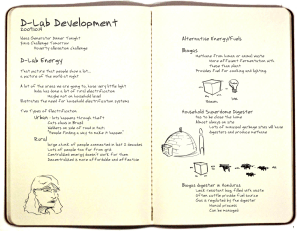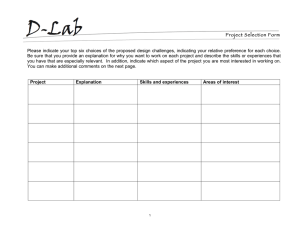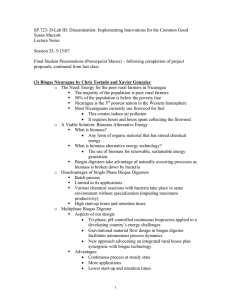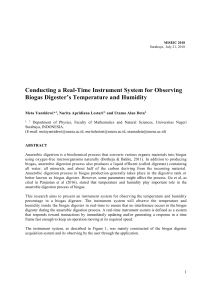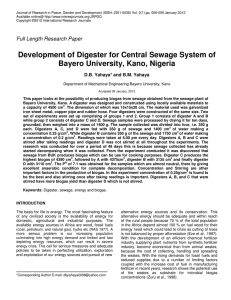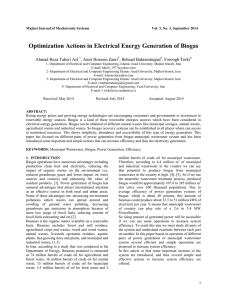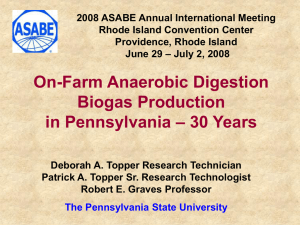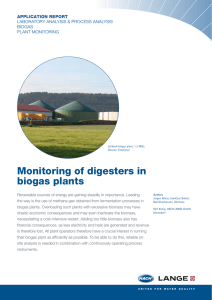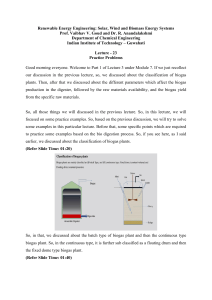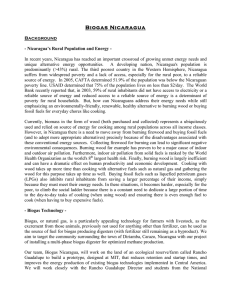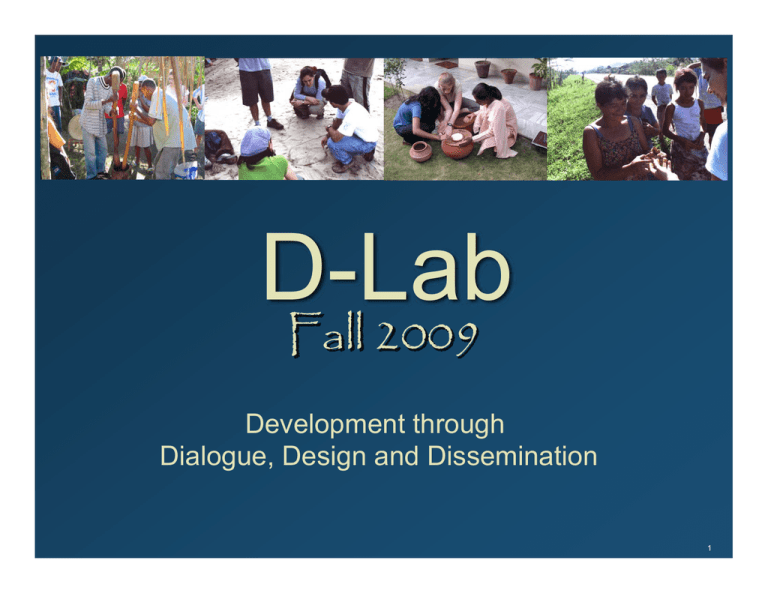
D-Lab
Fall 2009
Development through
Dialogue, Design and Dissemination
1
D-Lab
Energy
2
Public domain image (NASA)
3
Energy
•
•
•
•
•
•
Biomass, biogas and biodiesel
Sun
Human power
Wind and water
Rural energy delivery
Modeling energy systems
4
Some Energy Facts
Energy use/capita Electricity/capita
(kg oil equiv)
(kWh)
Energy from
biomass (%)
Electricity from
fossil fuels (%)
Brazil
1,114
1,955
26.5
10.8
China
1,242
1,585
13.7
81.5
Ghana
386
247
69.1
12.6
India
531
457
37.5
83.9
Peru
479
794
17.7
27.1
Tanzania
498
54
91.6
4.9
7,720
13,351
3
71.4
605
693
79.5
0.6
USA
Zambia
5
Urban Electrification
6
Urban Electrification
7
Urban Access to Electricity
Kinshasa
Rio de Janeiro
Lagos
Dhaka
San Salvador
Access to electricity
66%
10%
41%
90%
98%
8
Rural Electrification
• 800,000,000 have been connected to
power grids in the last 2 decades
• 2,000,000,000 are still not connected
• Decentralization is the key
–
–
–
–
Solar
Micro-hydroelectric
Wind
Biogas
9
Rural Electrification
• Health clinics
• Schools
• Small industry and enterprise
10
Energy for Cooking
• 2,400,000,000 people use biomass
(wood, charcoal, dung) for cooking
• Poor people can spend about 1/4 of
their income on energy for cooking
• In some areas, women spend 4-6
hours a day, walking up to 10 km to
gather firewood
11
Health Hazards
• Deforestation leads to decline in agricultural
production which leads to malnutrition
• Deforestation causes erosion which leads to
flooding and siltification of reefs and fisheries
• 1,800,000 people die each year of illness
related to smoke from cooking fires (single
largest cause of death in under-five-yearolds)
12
Possible Solutions
•
•
•
•
Alternative fuels
Efficient stoves
Smoke hoods
Solar cookers
13
Alternative Fuels
•
•
•
•
•
Liquid Petroleum Gas (LPG)
Kerosene
Biodiesel
Biogas
Charcoal from agricultural waste
products
14
Problems with
Alternative Fuels
• Infrastructure and distribution
systems
• Specialized equipment
• Cultural Acceptability
15
Biogas
• Methane gas produced from
human and/or animal waste
• Chemical process is most
efficient between 30°C and 40°C
• Provides fuel for cooking and
lighting
16
Biogas
• 1 m3 of biogas
– Lights a 60 W bulb for 6 hours
– Runs a 1 HP motor for 2 hours
– Cooks 3 meals for a family of 5 or 6
17
Ranikhet, India
18
The Fixed Dome Digester
19
The Fuel
20
The Stove
21
Guadalupe Carney,
Honduras
22
The Digester
23
The Fuel
24
Bokor National Park,
Cambodia
25
Floating Drum Digester
26
The Stove
27
Nyali, Kenya
28
Low-Cost Floating Drum
29
The Philippines
30
The Digester
31
The Cooker
32
Liaoning, China
33
The 4-in-1 Digester
34
The 4-in-1 Digester
35
The 4-in-1 Digester
36
Cultural Challenges
• Cultural taboos about working with manure
• Religious taboos against working with human
waste
• Other uses of feedstock
– building material
– fuel
• Changes in cooking behavior
• Changes is the social hierarchy
37
Construction
Challenges
•
•
•
•
•
•
Cost reduction
Maintenance
Supply chain
Transportation and storage of gas
Drying and packaging of effluent
Other opportunities for income generation
38
Biodiesel
• Has the highest BTU content of any
alternative fuel, comparable to diesel
• Comes from vegetable oils that have
been transesterified to reduce their
viscosity
• Can be used in diesel engines without
modifying them
39
Efficient Stoves
• Most traditional cooking stoves
are about 10% efficient
• Improved stoves have increased
efficiency of 20-25%
40
The Kenyan Jiko
© source unknown. All rights reserved. This content is excluded from our Creative
Commons license. For more information, see http://ocw.mit.edu/fairuse
41
Problems with Efficient
Stoves
• Specialized equipment
• User behavior can influence
efficiency
• Cultural acceptability
42
Smoke Hoods
Courtesy of Practical Action. Used with permission.
43
MIT OpenCourseWare
http://ocw.mit.edu
EC.701J / 11.025J / 11.472J D-Lab I: Development
Fall 2009
For information about citing these materials or our Terms of Use, visit: http://ocw.mit.edu/terms.

